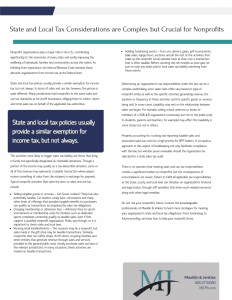Nonprofit organizations play a major role in the U.S., contributing significantly to the economies of every state and vastly improving the wellbeing of individuals, families and communities across the nation. As befits their importance, Internal Revenue Code exempt these altruistic organizations from income tax at the federal level.
State and local tax policies usually provide a similar exemption for income tax, but not always. In terms of sales and use tax, however, the picture is quite different. Many jurisdictions hold nonprofits to the same sales and use tax standard as for-profit businesses, obliging them to collect, report and remit sales tax on behalf of the applicable tax authorities.
The activities most likely to trigger sales tax liability are those that bring in funds not specifically designated as charitable donations. Though a portion of the income may qualify as a tax-deductible donation, some or all of this revenue represents a taxable transaction where payers receive something of value from the recipient in exchange for payment. Typical nonprofit activities that open the door to sales and use tax include:
Selling tangible goods or services – Girl Scout cookies? Tasty and also taxable, but only in two states. Car washes, candy bars, concessions and every other kind of offering that provides a tangible benefit to purchasers can qualify as transactions accompanied by sales tax obligations. State and local laws may categorize these sales as tax-exempt but often do not.
Charging membership or admission fees – Admission fees to sports tournaments or membership costs for facilities such as dedicated sports complexes commonly qualify as taxable sales, even if fees support a qualified nonprofit organization. Rules vary though, so it’s important to check state and local laws.
Charging membership or admission fees – Admission fees to sports tournaments or membership costs for facilities such as dedicated sports complexes commonly qualify as taxable sales, even if fees support a qualified nonprofit organization. Rules vary though, so it’s important to check state and local laws.
Holding fundraising events – Fun runs, dinners, galas, golf tournaments, bake sales, happy hours, auctions and all the rest of the activities that make up the nonprofit social calendar have at their core a transaction that is often a taxable one. Before counting the net receipts as pure gain, be sure to note any state and/or local sales tax liability stemming from these events.
Determining an organization’s tax responsibilities under the law can be a complex undertaking, since state rules often vary based on type of nonprofit entity as well as the specific activities generating revenue, the duration or frequency of these activities and the specific goods or services being sold. In some cases, taxability may rest on the relationship between seller and buyer; e.g. selling school uniforms or books to members of a 501(c)(3) organization community but not to the public (only to students, parents and teachers, for example) triggers liability for sales tax in some states but not in others.
But properly accounting for, tracking and reporting taxable sales and associated sales tax must be a high priority for NFP leaders. A scrupulous approach to this aspect of bookkeeping not only facilitates compliance with the law but will also prove invaluable should the organization be selected for a state sales tax audit.
There’s no question that meeting sales and use tax responsibilities creates a significant burden on nonprofits, but the consequences of noncompliance are severe. Failure to fulfill all applicable tax responsibilities at the state, county and local level can threaten an organization’s financial and legal status, through stiff penalties that drain much-needed resources along with other legal remedies.
Don’t risk your nonprofit’s future. Contact the knowledgeable professionals at Mauldin & Jenkins to learn more strategies for meeting your organization’s state and local tax obligations. From fundraising to future-proofing, we know how to help your nonprofit thrive.


